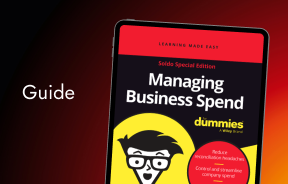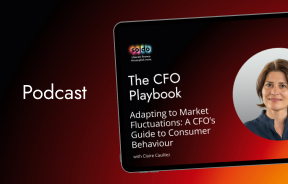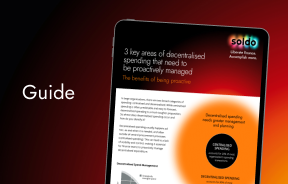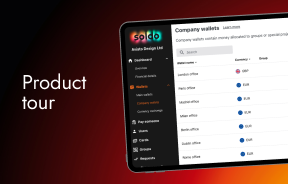Episode 58: Minna | Navpreet Randhawa, CFO
With 7 years of leadership experience, Navpreet Randhawa has a passion for Enterprise SaaS businesses with focus on the financial technology sector. He found himself on the path to being a self-described “accidental CFO” by having a drive to help build companies and be successful. Navpreet has leaned into prioritizing what is best for his business through the help of using technical tools and outsourcing many traditional aspects of a company’s finance department. As CFO at Minna, he strives to be as efficient and effective as possible by being a strategic finance leader that is open to any options that may help the bottom line.
To be a successful CFO, Navpreet feels you need to be practical and honest with your time and responsibilities. If you are stretching yourself too thin, then you need to reassess how your role is functioning. He thinks it is important to be open to using outside resources to make your job easier and better supported, searching out the best specialists to handle tasks. This means you need to admit to what you are and are not good at to help you face and solve problems to ensure growth at your company and in your role.
Navpreet believes it is important to be willing to rediscover and reinvent the wheel for how finance functions have been run in the past. He thinks you need to try avoiding feeling insecure. If you work hard and continue to educate yourself then you won’t ever fail, you will just be able to learn new things and apply those to new opportunities.
In this episode of The CFO Playbook, Navpreet talks about why it is important to crawl before you walk and walk before you run. He provides insight on his path from accounting to founding a company, and ultimately taking the learnings he gained from those experiences to be a forward thinking and open minded CFO. Navpreet explains the importance of prioritization, outsourcing, and why always being driven to achieve success are keys to being a great financial leader.
Take The CFO Playbook Listener Survey to help us improve the show. You’ll also be entered to win your choice of the latest iPad Pro or a Samsung Galaxy S7.
##
Guest Analysis
Name: Navpreet Randhawa
What he does: Navpreet Randhawa, CFO at Minna, has 7 years of leadership experience and a passion for Enterprise SaaS businesses with focus in the financial technology sector. His drive to help build companies and be successful lead him to become a self-described accidental CFO at Minna Technologies, a Swedish tech company on a mission to help retail banks and subscription businesses deliver powerful digital experiences within subscription management. Navpreet has leaned into prioritizing what is best for his business through the help of using technical tools and outsourcing many traditional aspects of a company’s finance department. As a CFO he strives to be as efficient and effective as possible by being a strategic finance leader that is open to any options that may help the bottom line.
Key Quote: “In my department I am accountable for everything. I have a vision of how it should run and where my time and energy should be. But I’m always listening and talking to vendors because they are the subject matter experts.”
Where to find Navpreet: https://www.linkedin.com/in/navpreet-randhawa-17651744/
##
From Navpreet’s Playbook
Take note of your mental health
One of the biggest tests is not always the work hours, but is more about the mental stress that can come from a job. Whether you are a founder or the financial leader of a company you are responsible whenever things are good or bad. You don’t need to take on challenges alone and don’t want your frustrations trickling down to others on the team. Take time to prioritize your work, your life, who you work with, and how you take on responsibilities. Be open and willing to collaborate and partner with others, both inside and outside your organization, utilizing the insight from those that may have been in your shoes before.
Be open to outsourcing
No matter how small or large your company is, be open to external resources and tools that can help your company’s finance function be successful. Instead of putting the stress on you, your team, and a multitude of internal programs and systems, take the opportunity to help your company by employing the newest and most innovative external resources that are built to empower you to be a better leader. Outsourcing as a way to remove as much as the manual process as possible will free up your time to focus on what is most important.
Only take on what you can manage
Don’t let yourself be spread too thin by taking on too much. The bottom line of your company being profitable should be a main focus of your efforts as a financial leader. Don’t be afraid to stand back and take a look at what works, what doesn’t, and where you need help to be prosperous. Spending too much time in one area, or using the wrong manual tools to do your job, may keep you stuck in the present or even the past. Doing everything you can to promote preparation and having a vision for the future are essential to seeing and taking advantage of potential opportunities.
Be proud of who you are
Take pride in who you are, what you know, and how hard you’ve worked in your career. Surround yourself with the right people who can help raise you up and provide insight and guidance to better yourself. Part of being a smart leader is being willing to work with others and put in the extra effort to succeed. Take chances and be secure in who you are. Continuously educate yourself and you will never truly fail, only gaining insight and tools to take on whatever comes next.
##
Episode Highlights
Practice prioritization
“I don’t take any pride in working a lot of hours. Especially, a couple of years back, I became a father. So I realized that I need to have a more balanced life and working all the time is not the best thing. I need to be more efficient with my time with where prioritization comes in. So, there’s an acceptance that I’m okay that I will miss out on certain things, but what I can’t miss out on are the important things.”
Outsourcing is a resource
“I had one condition to take this job, which is that I don’t want to build an in-house finance function. I will outsource everything. My view of the finance function going forward for any company I work for and build would be that we outsource. There are specialist companies that exist to do the job. The job of the CFO is to manage that CFO suite and to have the right companies and partners to provide information. My job is to analyze and look at those numbers and take a critical look at the business. That is what I always focus on.”
Fuel forward thinking
“Especially in a leadership role, you need to contribute to the top line. You need to contribute strategically to the business side and grow it forward. And that’s how I see myself. My value comes in making sure that Minna moves forward commercially and making sure there’s enough food to move Minna forward. Then there is fuel in the system in terms of capital and money. And, if I’m spending my time away from those two things, then that’s not the best use of my time. So, if I’m doing anything other than those two, I start looking at if I should really be doing that and how we can change it.”
Be principled in your process
“I’d encourage people to have a rule of thumb. A lot of people call it principles. Some people call it rule of thumb. For me, the more variables you have in the equation, the harder the equation gets. So, I try to eliminate variables. One thing that I’ve accepted is that I need to try new things. Unless I try it, I won’t know.”
Top quotes:
The biggest test for me was not the work hours. Right? I can work. It was more about the mental stress that comes with the job. Most often people were calling me a lot. It was very rare that somebody would call me and say hey, we secured a client. It was most often that, hey, this client did not sign or some of the bad news, or things that they could not handle themselves. It started coming to me, and rightfully so because I was the CEO of the company, I’m supposed to solve the matters or when bad things happen. I’m the one who should cover up when it piles on. And that’s when I felt a bit lonely. I was the one who was building the tech, the one who was taking care of administration, the one who was taking care of the money and the finances. So, everything piled on my plate.
I think if we would have done that at a much smaller scale (building his company), like first having 30 people in place to train and place. The whole journey, the ecosystem, we would have learned a lot more like the challenges on training, the challenges on mobilizing the challenges on placing and even post-placement support.
I had one condition to take this job, which is that I don’t want to build an in-house finance function. I will outsource everything. My view of the finance function going forward for any company I work for and build would be that we outsource. There are specialist companies that exist to do the job. The job of the CFO is to manage that CFO suite and to have the right companies and partners to provide information. My job is to analyze and look at those numbers and take a critical look at the business. That is what I always focus on.
We had a bookkeeping system, and then we had an expense management system. We have an equity management system. We have a board reporting system. So I got vendors and partners who are best in class, new age companies, helping CFOs to build a finance function in. And I have an in-house person to manage those relationships. So, the future for me, and another way I see it for any other company scaling, whether from 1 to 3 million, 1 to 5 million, or 5 to 50 million, I would still see outsourcing as a resource.
In my department I am accountable for everything. I have a vision of how it should run and where my time and energy should be. But, I’m always listening and talking to vendors because they are the subject matter experts.
When somebody says outsource, typically, historically, what we’ve seen is about finding a low cost and a cheaper solution. When I say outsourcing in finance for us, it’s basically getting softwares to do the job so we don’t have to manually do it.
Especially in a leadership role, you need to contribute to the top line. You need to contribute strategically to the business side and grow it forward. And that’s how I see myself. My value comes in making sure that Minna moves forward commercially and making sure there’s enough food to move Minna forward. Then there is fuel in the system in terms of capital and money. And, if I’m spending my time away from those two things, then that’s not the best use of my time. So, if I’m doing anything other than those two, I start looking at if I should really be doing that and how we can change it.
I don’t take any pride in working a lot of hours. Especially, a couple of years back, I became a father. So I realized that I need to have a more balanced life and working all the time is not the best thing. I need to be more efficient with my time with where prioritization comes in. So, there’s an acceptance that I’m okay that I will miss out on certain things, but what I can’t miss out on are the important things.
I’d encourage people to have a rule of thumb. A lot of people call it principles. Some people call it rule of thumbs, like I do. It’s about the more variables you have in the equation, the harder the equation gets. So I try to eliminate variables. And one thing that I’ve accepted is that I need to try new things. Unless I try it, I won’t know. And, I take a lot of pride in saying that I’m a smart person. I was willing to work hard and I’ll figure it out. And I want to surround myself with the right people.
My message to others is be secured, right? Nothing is going to change as long as you work hard. If you’re working hard and you’re you know educating yourself. If you’re a smart person and continuously educating yourself and willing to work hard, even if whatever you’re doing fails, you will still find something else.

















